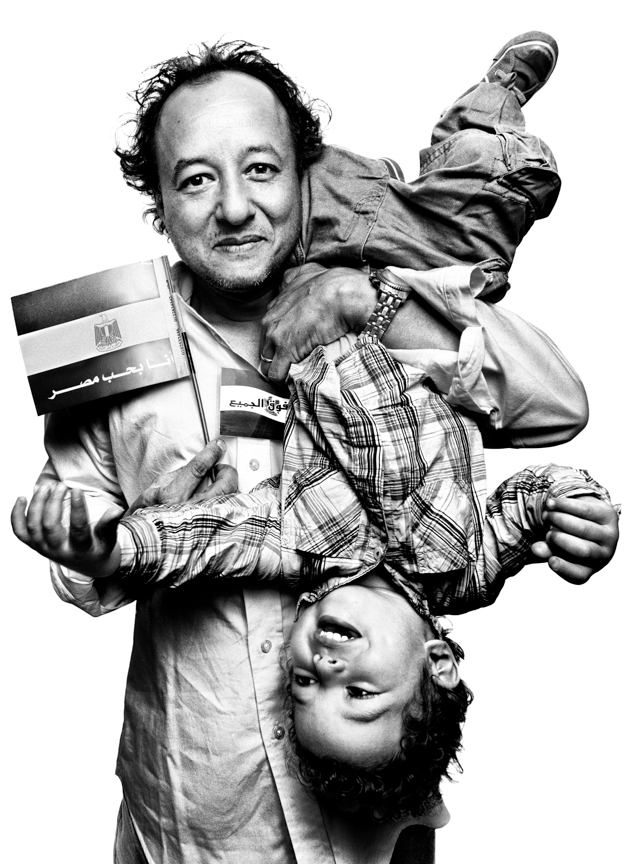Egypt's Transformers
Lorem ipsum dolor sit amet, consectetur adipiscing elit. Sed vel urna at nibh posuere facilisis at in magna. Vivamus rutrum ante tempus est auctor ullamcorper. Fusce a ligula vel risus imperdiet condimentum at sed nunc. Duis nulla ante, consequat non volutpat ac, egestas eget felis. Suspendisse eu accumsan est. Nunc commodo feugiat molestie. Etiam aliquam mollis sem gravida ultrices. In vitae lectus erat, quis pellentesque augue. Vestibulum sed lobortis tellus. Pellentesque sed risus eu felis tempor condimentum eu ac justo.

Jawad Nabulsi
Jawad was wounded in the eye with a lead pellet while protesting near the Semiramis Intercontinental hotel in Cairo on January 28. He works as a volunteer in organizations that help the poor and needy in Egypt. A Facebook page set up in his honor, called “We are all Jawad Nabulsi,” notes his selflessness after being injured: “While looking for a hospital to be treated for 10 hours, he listed down the names of others that needed to be treated although he himself needed someone to help him."

Aly Sobhy
Aly is a rising young Egyptian actor and professional clown who was arrested on March 9, 2011 and released four days later following a widespread public outcry. During the time he was held by the Egyptian army, Aly was tied up by his hair to a lamppost and brutally tortured, as his captors taunted him with one of the signature slogans of the revolution, "Hold your head high; you're Egyptian." The military released Aly Sobhy on March 13, due to no evidence of wrongdoing on his part.

Gasser Abd El Razek with his son, Khalil Gasser Abd El Razek
Gasser Abd El Razek with his son, Khalil Gasser Abd El Razek. Abd El Razek is a human rights advocate, member of the board of the Egyptian Organization for Human Rights, and country director for Africa and Middle East Refugee Assistance Egypt. “The first thing I took to Tahrir Square, which is a practical thing, was my satellite phone. The second thing I took, which is the most important, is my son who was 18 months old at the time. Even though he wouldn’t understand what was going on, I think it’s what shapes his future and I really wanted him to be there.”

Naema El Sayed and her child, Yassin Lotfy
Neama and Yassin are the child and widow of a protester killed by the Egyptian security forces during the Tahrir Square demonstrations.

Ahmed Abul Einen
Ahmed is a devout Muslim living in Cairo’s Old City. While he did not take part in Tahrir Square protests, he protected the Old City as part of the “neighborhood watch” groups during the security vacuum and “prayed every day” for the success of the protesters.

Remy Essam
Remy is a charismatic singer, guitarist and songwriter who became famous during the Tahrir Square protests as “The Singer of the Square.” He was detained and tortured by the Egyptian military after President Hosni Mubarak fell.

Sondos Shabayek
Sondos is a writer for independent Egyptian newspapers and magazines. She is a ‘citizen journalist’ who participated in, and tweeted, the story of the Tahrir Square protests.

Egyptian journalist and socialist activist, Gigi Ibrahim, holds up her cell phone.

On April 1, 2011, Egyptians returned to Tahrir Square in Cairo for a rally to “save the revolution” and protect their right to demonstrate.

Alaa Al Aswany
Alaa Al Aswany is an Egyptian and author of the acclaimed novel The Yacoubian Building. He was a founding member of the political opposition movement Kefaya (“Enough”), is a practicing dentist and an influential news columnist. “I really do believe writing a good novel is much more important than being the president of Egypt."

Mohammed Abbas and Moaz Abdel Karim
As youth leaders of the Muslim brotherhood, Mohammed and Moaz worked with Christian groups in the protest.

Heba Morayef
Heba, an Egyptian Cairo-based researcher for Human Rights Watch covering Egypt, was in the middle of the demonstrations and violence during the Tahrir protests. By visiting hospitals and morgues, she researched and documented the civilian death toll from government attacks and sniper fire. That figure became the indispensable count for global media as Mubarak teetered in power.

Laila Said with Wael Ghonim
Laila is the mother of Khaled Said, whose torture and murder by Egyptian police on June 6, 2010, helped to spark the discontent that eventually led to the Tahrir Square protests and President Hosni Mubarak’s downfall. Speaking out about the murder of her son, Laila became known as the “Mother of Egypt” and as an emblem of the consequences of endemic police torture and impunity.
Wael Ghonim is an Egyptian internet activist and computer engineer. For eleven days he was interrogated by Egyptian police regarding his work as one of two administrators of the Facebook page, "We are all Khaled Saeed."

Dr. Nawal El Saadawi
Dr. Saadawi is an Egyptian writer, veteran women’s rights advocate, psychiatrist and author of more than forty fiction and non-fiction books, many of which address the persecution of Arab women. In 1981 she was imprisoned after being charged with “political offenses.” In 1982, she founded the Arab Women’s Solidarity Association.

Resident of Cairo, photographed on El Moez Ledeen Ellah, one of the city’s oldest streets.

A tear gas canister, made in the United States, which was used to disperse protesters in Tahrir Square.

A man and his son at a rally in Tahrir Square.

